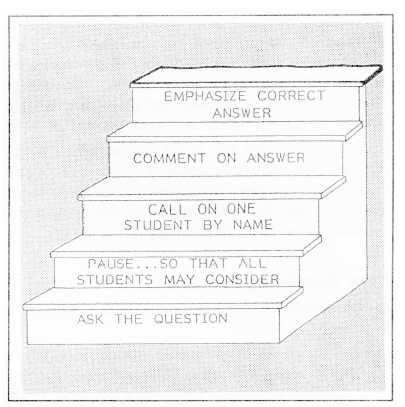At this point in my planning career, I find myself looking to vary the action verbs I use, more so for the looks good effect, than determining proper cognition. This leads into this weeks reading on effective questioning. As I teach I know the importance of asking questions and getting my learners to really think and engage with the material. However, what is to many questions and how do I determine the level of cognition of these questions. These are all areas that are fuzzy at the moment but it appears that we just haven't learned how yet.
As I read over the article on questioning I have begun to see the depth and process of determining questions and then deciding how or to whom to ask the question, then there is a process of determining who to call on.
 I know that so far I typically as questions of the entire class to check for comprehension then call on students who seem weary of producing the best answer or students that have volunteered. I also catch myself asking students direct questions if they are purposely not paying attention or goofing off while in lab.
I know that so far I typically as questions of the entire class to check for comprehension then call on students who seem weary of producing the best answer or students that have volunteered. I also catch myself asking students direct questions if they are purposely not paying attention or goofing off while in lab.I have never explored the ideas of how may questioning techniques there are and the effect that employing certain techniques will have on a students performance. In addition, I stubble to be the determiner, that decides if knowing the definition of something or being able to the list the steps is enough or if all concepts covered should be learned in depth. I suppose this all goes back to looking at our program and determining what we teach and what our students will be tested on both for state examinations as well as national examinations such as the NOCTI. Its exiting to see how all of these pieces we are learning about in various AEE classes are slowly all coming together.
To further expand on this topic I found a great blueprint tool that explains what students need to know in each area to be successful on the NOCTI examination for production agriculture. I know that this often raises questions and concerns about teachers teaching to the test, but the concepts covered are broad and leave room for interpretation and local program autonomy. Knowing these general concepts and being able to find these resources will help to guide me when deterring the depth of knowledge students will need to achieve as well as construct my unit plans
and future curriculum.
Deanna, I think we're all trying to find the balance of asking the right amount of questions at the correct cognitive level without asking too many or ones that are too far above or too far below what we're teaching our students. I think with some more practice we'll get there! Also I love your NOCTI blueprint tool! I think that's a great find and will be really useful for our lesson and unit planning.
ReplyDelete